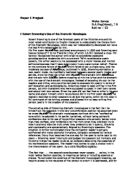Like the painters of the Italian Renaissance, Browning too had no dislike for the body, its life, its beauty, power and charm. Fra Lippo Lippi is a picture no only of a man, but of the time and its temper, when religion and its morality had lost their ancient power over society in Florence; when the claim to give to human nature all it desired had stolen into the church itself. In this poem it is not difficult to see the passionate Renaissance love of the beauty and delights of earthly life. We also see the conflict between the medieval traditions of religions art and the new Renaissance ideals. The Prior wants Lippo to paint the souls of men in such a way as to induce religious feelings; he does not want the life-like representation of the body which would distract the mind from spiritual contemplation-this is typically the asceticism of the Middle Ages. Fra Lippo Lippi, on the hand, in true Renaissance vein, feels :
This world’s no blot for us,
Nor blank; it means intensely and means good.
To find its meaning is my meat and drink.
Thus we have the spirit of the Italian Renaissance with its free and frank enjoyment of the senses and the Renaissance ideal of art which sought to represent not merely the beauty of the mind but also the beauty of the body. At the same time, we are also struck by the curious paradoxes that fraught that great age and which Browning so well reflects in his poem-the monk and friar indulging in amorous affairs contrary to their religious vows.
In another poem concerned with art, namely, Andre Del Sarto, we have created for us’ the spirit of the Renaissance again, though of a later vintage than in Fra Lippo Lippi. Here we have the representation of the conflict between technical perfection and imaginative or idealistic vision. Andre is a perfect craftsman, but Rafael and Michael Angelo were artists of the soul expressing in their pictures ‘the divine discontent’ of their souls. Says Andrea sadly :
Ah, but a man’s reach should exceed his grasp,
Or what’s heaven for ? All is silver-grey
Placid and perfect with my art : the worse !
The words imply that the great art of the period reflected the striving of the mind for higher regions, the fire of passion and glory of man's spirit through flamboyant colours-all of which, sadly, was not within reach of Andre.
In a Grammarian's Funeral we are given the picture of a typical Renaissance scholar whose life was dedicated to study of the classics in the endeavour whose life was dedicated to study of the classics in the endeavour to unravel minute niceties of grammar and language. Here, too, we have the poet capturing through the eulogy of one of the pall bearers the spirit of seeking for knowledge that gripped the Renaissance mind. Of course, the Renaissance spirit as reflected in this poem is more inspired by the German renaissance than the Italian Renaissance, as one critic has pointed out. In Germany the love of beauty had a distinct religious and spiritual aspect to it which was lacking in the Italy of the Renaissance. The Renaissance Germany had no love for beauty for beauty's sake alone. The love of knowledge or beauty was modified into seriousness of life, carried beyond this life in thought, kept clean, and, though filled with incessant labour on the earth, aspired to reach its fruition only in the life to come. This is the spirit and the atmosphere of A Grammarian’s Funeral.
Two famous poems which reflect to a nicety the atmosphere and ethos of the decadent Italian Renaissance are My last Duchess and The Bishop Orders his Tomb at St. Praxes's Church. The Duke of Ferrara is the ultimate picture of the disagreeable aspect of the Italian Renaissance. Through the Duke of Ferrara's words is conveyed the very essence of the age-its intrigue, avarice, shrewd mercenary instincts, hypocrisy, and an exquisite taste for art devoid of appreciation for life. The poem is remarkable for capturing the spirit of an age in the space of just fifty-six lines.
In The Bishop Orders his Tomp at St. Praxed's Church, we once again experience the ethos of the decadent Italian Renaissance. The diverse features of the complex age are exquisitely captured. The Bishop wishes for luxurious gifts for his sons if his directions were carried out, and these gifts reflect the age's love of beauty, precious manuscripts, horses and grand houses. There is revealed all its love of colour, pomp and show as well as its greed and sensuality, as De Vane remarks. The basic Renaissance spirit-its world liness, inconsistency, pride, hypocrisy, ignorance of self, love of art, of luxury, and of good Latin find apt expression in this poem. We are places in the full decadence of the Italian Renaissance. Its total loss of religion even in the church; its immorality-the bishop's deathbed is surrounded by his natural sons and the wealth he leaves has been purchased by every kind of iniquity-its pride of life, its luxury; its semi Paganism; its imitative classicism; its inconsistence; its pleasure in the adornment of death, its delight in the outsides of things and mere workmanship; its loss of originality; its love of scholarship and beauty for their own sakes; its contempt to common people; its exhaustions-are one and all revealed or suggested in this poem.
We have in many of Browning's poems the reflection of the Renaissance, both in its nobler aspects and in its decadent aspects.







